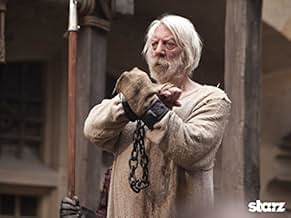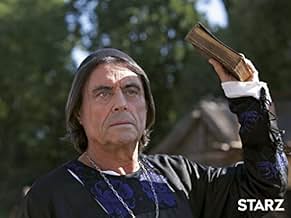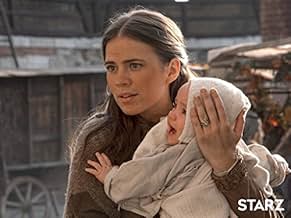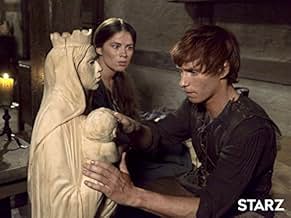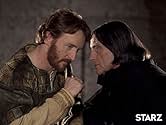Set against a backdrop of war, religious strife and power struggles which tears lives and families apart.Set against a backdrop of war, religious strife and power struggles which tears lives and families apart.Set against a backdrop of war, religious strife and power struggles which tears lives and families apart.
- Won 1 Primetime Emmy
- 5 wins & 35 nominations total
Browse episodes
Featured reviews
One of my favorite books of all time turned into a TV series that shows up out of no where. I was expecting something truly disappointing. After watching the first two episodes I can honestly say this is beyond my highest expectations. The plot development is different from the book, but the emotional impact of the story is fully present. The character development draws you in just like the book did. Your desire to know what happens next will surpass that of reading the book. It is such a wonderful thing to see an adaptation that captures it's source so fully and even surpasses it at times. I can't wait for the remaining episodes. This show will win many awards. Addendum after Episode #3: Things dipped a bit in this episode. If I was rating this show using the 10 stars that IMDb uses, I would have gone from 9 previously to 7 now. There were some overly cheesy moments in this episode that seemed to dilute the storytelling skill from the first two episodes. Hopefully this is a rare occurrence.
Ken Follett is one of the most brilliant novelists of modern times. His stories immerse and engage the reader into worlds so real that it seems possible to step into them.
"Pillars of the Earth" is one of his most popular books. Originally published in 1989, it gained a cult following through word of mouth then achieved even greater prominence when Oprah discovered back in the mid 1990s.
Tandem Productions and Tony and Ridley Scott took the risk of adapting the sweeping historic novel into a miniseries. The novel is such an intricate spiderweb of lust, revenge, and triumph of an iron will that the mere act of adapting the screenplay for sound-bite and short attention span 21st century viewers was a daunting challenge.
After all, the book is almost 1,000 pages long and covers an approximate 40 year period. My original review of the series came just after it aired and I had only seen part 1. Having reread the novel recently and re-watched the entire series 14 years later, here are some new thoughts.
The best part is that all of the novel's characters are there. Practically all of them are true to how they were described in the novel, with the most spectacular casting being Jack Jackson. Then unknown actor Eddie Redmayne brought the character to life in a delightful way showing his sensitivity and strength at the same time. Natalia Woerner nearly steals the show with her portrayal of the mysterious Ellen, Jack's mother.
The other strong woman character is Lady Aliena, portrayed beautifully by Hayley Atwell. A Ken Follett hallmark is his ability to populate his stories with strong women characters going all the way back to "Eye of the Needle" where Lucy Rose outwits a dangerous Nazi spy. In "Pillars," Lady Aliena rises from pampered highborn daughter to one of the most important merchants in Kingsbridge.
Some reviewers who loved the novel blanched at the changes producers made for the miniseries. The kings and queens in England play much smaller roles in the novel, but in the miniseries more attention is paid to them since it gives context and scope to the struggles of the monastery in Kingsbridge and the odds stacked against them in building their "compass to God" cathedral. One of the most arresting scenes from an early episode happens when Prior Phillip must confer with King Stephen about assistance in building a cathedral and the king conducts the meeting outside the castle ramparts with archers bearing down on them.
The most glaring character change occurred with Regan Hamleigh, who is described in the novel as an ugly crone but in this miniseries is portrayed by the opposite-of-ugly actress Sarah Parish. Well, they made her personality ugly anyway, and her son, Lord WIlliam Hamleigh is as much of a fiendish villain in the miniseries as in the novel. The producers added an Oedipal element to the relationship between William and his mother, which may have disappointed or even outraged some novel purists but for me seemed ingenious. It added a further creepy element to both characters.
Speaking of creepy; Ian McShane as Bishop Waleran is a great character and performance for which he should have won an Emmy. His voice booms like a thunderclap as he is involved in one double-dealing after another between the Hamleighs and the Kingsbridge monastery.
The special effects and art direction masterfully create the grimy, gritty world of 1100s England and the stark contrasts between privileges of royalty and serfs wallowing in the mud beside the hogs they keep. Public executions and dismembering are commonplace as one plot change involving the deposed Earl Bartholomew of Shiring (portrayed aristocratically by Donald Sutherland) tears at the heart.
While the novel relied on straightforward storytelling, the miniseries offers deftly executed, haunting flashbacks to establish the mysterious Ellen's role in the dirty laundry of Percy Hamleigh and Archbishop Waleran's past. Her husband had been mysteriously executed around the time the ship burned. Ellen's son Jack, who is portrayed as an artistic savant, becomes a force in building the cathedral.
Overall, the television miniseries should thrill the fans of the novel. Even the opening credits contain a clever, metamorphosing animated sequence and a stirring dramatic musical score punctuates and accentuates the grandeur.
"Pillars of the Earth" is one of his most popular books. Originally published in 1989, it gained a cult following through word of mouth then achieved even greater prominence when Oprah discovered back in the mid 1990s.
Tandem Productions and Tony and Ridley Scott took the risk of adapting the sweeping historic novel into a miniseries. The novel is such an intricate spiderweb of lust, revenge, and triumph of an iron will that the mere act of adapting the screenplay for sound-bite and short attention span 21st century viewers was a daunting challenge.
After all, the book is almost 1,000 pages long and covers an approximate 40 year period. My original review of the series came just after it aired and I had only seen part 1. Having reread the novel recently and re-watched the entire series 14 years later, here are some new thoughts.
The best part is that all of the novel's characters are there. Practically all of them are true to how they were described in the novel, with the most spectacular casting being Jack Jackson. Then unknown actor Eddie Redmayne brought the character to life in a delightful way showing his sensitivity and strength at the same time. Natalia Woerner nearly steals the show with her portrayal of the mysterious Ellen, Jack's mother.
The other strong woman character is Lady Aliena, portrayed beautifully by Hayley Atwell. A Ken Follett hallmark is his ability to populate his stories with strong women characters going all the way back to "Eye of the Needle" where Lucy Rose outwits a dangerous Nazi spy. In "Pillars," Lady Aliena rises from pampered highborn daughter to one of the most important merchants in Kingsbridge.
Some reviewers who loved the novel blanched at the changes producers made for the miniseries. The kings and queens in England play much smaller roles in the novel, but in the miniseries more attention is paid to them since it gives context and scope to the struggles of the monastery in Kingsbridge and the odds stacked against them in building their "compass to God" cathedral. One of the most arresting scenes from an early episode happens when Prior Phillip must confer with King Stephen about assistance in building a cathedral and the king conducts the meeting outside the castle ramparts with archers bearing down on them.
The most glaring character change occurred with Regan Hamleigh, who is described in the novel as an ugly crone but in this miniseries is portrayed by the opposite-of-ugly actress Sarah Parish. Well, they made her personality ugly anyway, and her son, Lord WIlliam Hamleigh is as much of a fiendish villain in the miniseries as in the novel. The producers added an Oedipal element to the relationship between William and his mother, which may have disappointed or even outraged some novel purists but for me seemed ingenious. It added a further creepy element to both characters.
Speaking of creepy; Ian McShane as Bishop Waleran is a great character and performance for which he should have won an Emmy. His voice booms like a thunderclap as he is involved in one double-dealing after another between the Hamleighs and the Kingsbridge monastery.
The special effects and art direction masterfully create the grimy, gritty world of 1100s England and the stark contrasts between privileges of royalty and serfs wallowing in the mud beside the hogs they keep. Public executions and dismembering are commonplace as one plot change involving the deposed Earl Bartholomew of Shiring (portrayed aristocratically by Donald Sutherland) tears at the heart.
While the novel relied on straightforward storytelling, the miniseries offers deftly executed, haunting flashbacks to establish the mysterious Ellen's role in the dirty laundry of Percy Hamleigh and Archbishop Waleran's past. Her husband had been mysteriously executed around the time the ship burned. Ellen's son Jack, who is portrayed as an artistic savant, becomes a force in building the cathedral.
Overall, the television miniseries should thrill the fans of the novel. Even the opening credits contain a clever, metamorphosing animated sequence and a stirring dramatic musical score punctuates and accentuates the grandeur.
I've only seen two episodes, so this is a somewhat uninformed review. Oh, and I haven't read the book, which probably helps to enjoy the show as it's own creation.
It's important to note that Ridley Scott is a producer and his most recent film Robin Hood, shares quite a resemblance to the general story and setting of Pillars. (Side note; the opening credits are exactly the same). If you've seen Robin Hood, then you get the Monarchical, religious complications as well as the bleak, foggy, dark blue world backdrop of old England.
I was expecting a more fantastical, mythical world, but this series is pretty grounded in reality so far.
The show's greatest strength is the actors. You can't go wrong with Donald Sutherland and Rufus Sewell in a TV series. And Ian McShane is always great, especially when he's playing a dark character.
Might not blow you away, but unless the show takes a nosedive, it's definitely worth watching.
It's important to note that Ridley Scott is a producer and his most recent film Robin Hood, shares quite a resemblance to the general story and setting of Pillars. (Side note; the opening credits are exactly the same). If you've seen Robin Hood, then you get the Monarchical, religious complications as well as the bleak, foggy, dark blue world backdrop of old England.
I was expecting a more fantastical, mythical world, but this series is pretty grounded in reality so far.
The show's greatest strength is the actors. You can't go wrong with Donald Sutherland and Rufus Sewell in a TV series. And Ian McShane is always great, especially when he's playing a dark character.
Might not blow you away, but unless the show takes a nosedive, it's definitely worth watching.
Set in England during medieval times, this is a fictional account of what happens after a dying king's proper heir dies in a shipwreck. There are many characters(including a family that seek to construct a grand cathedral, two siblings who lose their nobility and try to regain it, and several men of God with more or less pure intentions
and granted, not everyone is actually necessary) and a lot of plot, and it can be dizzying at first, but it is worth your attention(if you like what you see early on
it ain't gonna change). While I have not read the novel and can make no comparisons, I watched this with two people who love it and they both said that it wasn't the exact same and that they still enjoyed it a lot. This is gripping right off the bat, and it keeps to an intense pace throughout. There are many developments, and while it can at times come off as just going back and forth between the same couple of options, you tend to follow them with interest surpassing that of the best banks. The tension and suspense are great. This has good and well-delivered dialog, with many memorable lines(and razor-sharp points about what it was like back then). The exploration of the awful situations that people could be and were stuck in back then, on account of the system, religion and their lack of rights is excellent and chilling. This is realistic(a lot of the way), authentic and has an incredible richness of detail. The strong feminist behavior of the women in this would not have been tolerated as we see here. This has mostly credible psychology, including for the villains(if one or two are black and white in depiction). The acting, writing and direction are marvelous, and the music is as well. This has amazing production values. No one is sacred, anyone could die at any time in this. The twists and unexpected turns of events keep you guessing how it will end, and it is fairly satisfying. There are power struggles, deception, politics and manipulation aplenty. This does seem to think itself Shakespeare at times, using effects right out of Macbeth and Hamlet. There is dramatic license leading to things that couldn't happen
happening. This has some humor. There is some action, and it works well. You can tell this was executive produced by the Scott brothers. The atmosphere is fitting, this always builds the right mood. This can be called a soap opera to some extent, though I would classify it as one of the better ones. Redmayne is a Christian Bale wannabe once he starts talking(he does thankfully refrain from the pitiful Eastwood impersonation). There is a lot of disturbing content, a bit of blood and violence, sexuality, nudity and a little strong language(largely it isn't gratuitous). I recommend this to any fan of epics. 8/10
I have read everything Ken Follett has written, but I pretty much had him pegged as a writer of extraordinarily readable suspense potboilers. Better than Stephen King, but no Cormac McCarthy. Then, in 1989 he unveiled "Pillars of the Earth" and I was stunned. Follett gave full rein to his incredibly vivid and compelling storytelling abilities. When I finished I was sad. I could no longer follow the adventures of these heroic and scheming English men and women in the the tumultuous 12th Century, a time of uncertainty over who should be on the throne.
I have now watched the first six episodes (available on Netflix for instant viewing) and am dying to see the final two when they come available. I didn't know what to expect, but I can declare myself fully satisfied.
What worried me most going in was the series was what the tone would be. Follett is a master of grand, operatic gestures. The mini-series captures that.
He also is far from shy about sex, barbarism and vulgarity. There's a scene when the monks put Ellen on trial as a witch that made my jaw drop. No F-bombs, but one startling c**t bomb. The incest theme between William and his mother is not explicitly shown, but very clear.
Occasionally, it's a bit "stagey" and the CGI is good, but not state of the art.
Still, "Pillars" is a triumph of epic storytelling.
I have now watched the first six episodes (available on Netflix for instant viewing) and am dying to see the final two when they come available. I didn't know what to expect, but I can declare myself fully satisfied.
What worried me most going in was the series was what the tone would be. Follett is a master of grand, operatic gestures. The mini-series captures that.
He also is far from shy about sex, barbarism and vulgarity. There's a scene when the monks put Ellen on trial as a witch that made my jaw drop. No F-bombs, but one startling c**t bomb. The incest theme between William and his mother is not explicitly shown, but very clear.
Occasionally, it's a bit "stagey" and the CGI is good, but not state of the art.
Still, "Pillars" is a triumph of epic storytelling.
Storyline
Did you know
- TriviaMany tourists visit Kingsbridge in the English county of Devon to visit its world famous cathedral. However, the Kingsbridge of the novel on which this series is based is entirely fictional and has nothing whatsoever to do with the real Kingsbridge in Devon, much to the disappointment of people who find they have travelled to see a cathedral that has never existed.
- GoofsThroughout the series, Stephen and Matilda are both referred to as "Majesty". English kings and queens did not use the title "Majesty" until the middle of the 16th century, nearly 400 years after the setting of this series
- ConnectionsFeatured in The Wright Stuff: Episode #14.55 (2010)
- How many seasons does The Pillars of the Earth have?Powered by Alexa
Details
- Release date
- Countries of origin
- Official site
- Languages
- Also known as
- 聖殿春秋
- Filming locations
- Production companies
- See more company credits at IMDbPro
- Runtime1 hour
- Color
- Sound mix
- Aspect ratio
- 1.78 : 1
Contribute to this page
Suggest an edit or add missing content







